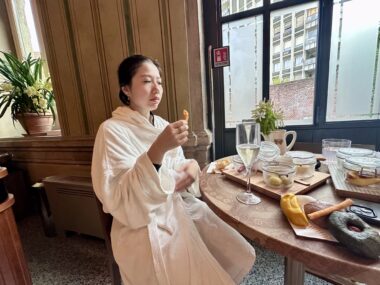Our tips to maintain a healthy marriage while caregiving
My wife and I continue to work hard to strengthen our bond
Written by |

As a husband and father of a child with a rare disease, I’ve seen firsthand how being a caregiver can test a marriage.
Our daughter, Rylae-Ann, has aromatic l-amino acid decarboxylase (AADC) deficiency, a rare genetic disorder that affects neurotransmitter production, causing hypotonia, developmental delays, and ongoing medical demands. After Rylae-Ann’s diagnosis, my wife, Judy, and I faced endless appointments and were exhausted, which sidelined our relationship.
Yet, we continue to work hard to strengthen our bond. The months before Rylae-Ann received gene therapy were the most difficult. After that, and with our daughter more independent, life became easier. However, there are still many challenges in maintaining a strong marriage. For us, that’s where committing to communication, date nights, and couples therapy has come in.
Talking is therapy
Communication is key, especially when your life is built around caregiving, which Judy and I call the caregiver lifestyle. We schedule brief “check-ins” after Rylae-Ann’s bedtime, sharing our day’s highs, lows, and needs. This prevents frustration from building up.
Active listening has transformed how we relate to each other. I used to rush solutions, but now I’m learning to validate her emotions and promote collaboration by restating her spoken concerns and asking what I can do: “You’re overwhelmed by the schedule. How can I help?”
We also talk openly about things we anticipate having to address, like care plans. We begin with 15-minute timed talks every day, embracing vulnerability. Books and rare disease forums offer tailored prompts to enhance these discussions.
Date nights recall old times
Date nights don’t require outings. Like everything, we adapt them to our routine.
Our “indoor picnic” involves a living room blanket, simple foods that fit Rylae-Ann’s needs, and gentle music and lighting. Rylae-Ann wasn’t always part of it, and actually, it’s better to have dad and mom time as often as possible.

Judy Poulin enjoys a snack at a spa with her husband, Richard, during a date night. (Photo by Richard E. Poulin III)
Themed movie nights recall old times. We dim the lights, make popcorn, and turn off the phones. Just the two of us enjoying the movie and escaping from reality.
Birthdays can amplify romance. For Judy’s birthday this month, her parents let us have a night on the town. Judy was sure to monitor Rylae-Ann remotely, but other than that, it was us enjoying the evening. We also squeezed in time at the spa and received a well-deserved facial and massage.
Having friends from rare disease groups enables occasional escapes with friends who can relate to our lives. Through new friendships, we’ve become more sociable and can enjoy getaways with friends.
Seeking support
Stress can breed tension. We sought support when our arguments focused on care. Finding a couples therapist who can support a family through tough days is a strength, not a weakness. After all, we emphasized early intervention for our daughter, so we must also consider our own needs. Being mindful of signs like irritability or indecision is necessary because a solid couple bolsters a child’s well-being.
We have found through our parent meet-ups that we can address our grief about not having a “normal” family life, while still cherishing our own. We journaled our feelings and attended burnout workshops. Teletherapy may also be an affordable option for some.
Judy and I are proof that relationships can endure and offer caregiving with purpose. It’s essential to find a healthy way to communicate, to spend time doing things together, and to seek help when you’re out of your depth. You’re not alone in the AADC deficiency or rare disease communities.
Note: AADC News is strictly a news and information website about the disease. It does not provide medical advice, diagnosis, or treatment. This content is not intended to be a substitute for professional medical advice, diagnosis, or treatment. Always seek the advice of your physician or other qualified health provider with any questions you may have regarding a medical condition. Never disregard professional medical advice or delay in seeking it because of something you have read on this website. The opinions expressed in this column are not those of AADC News or its parent company, Bionews, and are intended to spark discussion about issues pertaining to aromatic l-amino acid decarboxylase deficiency.





Leave a comment
Fill in the required fields to post. Your email address will not be published.